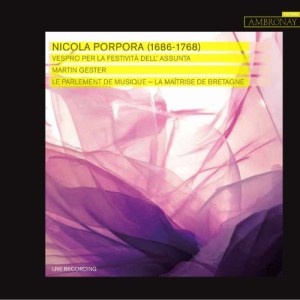 |
 |
|


alternatively
CD:
MDT
AmazonUK
AmazonUS
|
Nicola PORPORA (1686 - 1768)
Vespro per la Festività dell'Assunta
Laudate pueri Dominum [19:18]
Salve Regina [15:26]
Laetatus sum [17:46]
Lauda Jerusalem [11:30]
 Marilia Vargas, Michiko Takahashi (soprano), Delphine Galou
(contralto)
Marilia Vargas, Michiko Takahashi (soprano), Delphine Galou
(contralto)
La Maîtrise de Bretagne, Le Parlement de Musique/Martin Gester
rec. live, 16 September 2011, abbatial church of Ambronay, France.
DDD
Texts and translations included
 ÉDITIONS AMBRONAY AMY030 [64:03]
ÉDITIONS AMBRONAY AMY030 [64:03]
|
|
|
Nicola Porpora seems to enjoy increasing popularity these days.
For many years hardly any disc with his music came my way, but
in the last couple of years I had the opportunity to review
several discs with both secular and sacred music. On this site
you can find two reviews of recordings with cantatas (review; review) and on my own site you can find various reviews of discs
with sacred music (reviews). Porpora has
become mainly known as a composer of operas and secular cantatas,
and historically he is considered one of the most important
singing teachers. One of his pupils was the famous castrato
Farinelli. Solfeggi which are attributed to him were still used
in the 19th century.
Part of his sacred oeuvre was written during his time in Venice
when he worked in various ospedali, the famous institutes
for girls which were in fact conservatories. The girls were
taught various instruments and also received singing lessons.
The music on this disc was all written for the Ospedaletto
or Ospedale dei Derelitti where Porpora was appointed
as singing teacher in 1744. That is also the date of the Vespers
which Martin Gester has recorded.
The title of this disc is a little misleading, though. We don't
get a Vesper service as one may expect. That is even not possible:
we have a list of the pieces which Porpora had included in his
Vespers, but a number of them have been lost. These are the
invocation Deus in adiutorium, the Psalms Dixit Dominus
and Laudate pueri, the Salve Regina and the Magnificat.
The Salve Regina in this performance has been chosen
from another source. From a different source dating from 1745
two settings of the Psalm Laudate pueri are available.
One of them has been chosen because its scoring is the same
as those of the 1744 Psalms: women's voices, divided over two
sopranos and alto, both in soli and tutti. Part of the live
performance which was recorded for this disc was also a setting
of the Dixit Dominus. Unfortunately it has been omitted
because of a lack of space.
As this is no reconstruction of a Vesper service it doesn't
really matter that the Salve Regina has been put at the
liturgically wrong spot. It is a vocal showpiece which is typical
for the Italian baroque. The second verse, 'Ad te clamamus',
is treated like an opera aria. The next verse, 'Ad te suspiramus',
is characterised by broad gestures, as one would expect with
words like "suspiramus" (sigh), "gementes" (mourning) and "flentes"
(weeping). In the verse 'Illos tuos' Porpora has included a
solo part for the violin.
The programme begins with Laudate pueri Dominum which
opens with a duet of the two sopranos. It becomes immediately
clear that the solo parts are technically demanding, moving
up and down through the scale and including very long coloraturas.
It bears witness to the great skills of the girls at the various
ospedali in Venice. The fourth section, 'Qui habitare',
begins with a long instrumental introduction which includes
a part for solo cello.
In the various Psalms cadenzas are sung at the end of several
sections. In 'Quia illuc' (Laetatus sum) we even get
two, at the end of each of the two sections. It only underlines
the operatic character of Porpora's sacred music. This is reflected
in the string parts with its vivid rhythms and often dramatic
gestures.
I have nothing but admiration for the performances of the three
singers. They have very fine and agile voices, and are meeting
the high requirements of this music with impressive ease. The
two sopranos have voices which are easy to tell apart, but they
blend perfectly. They sing with a good sense of drama without
exaggeration and without using a lot of vibrato. Delphine Galou
is a true contralto, with a strong and clear low register. Her
performance of the Salve Regina is technically assured
and expressive. The orchestra gives ardent support. The role
of the choir is limited, but it sings well, and cooperation
with the soloists in those sections in which they alternate
is perfect.
Johan van Veen
http://www.musica-dei-donum.org
https://twitter.com/johanvanveen
|
|




 All Nimbus reviews
All Nimbus reviews








